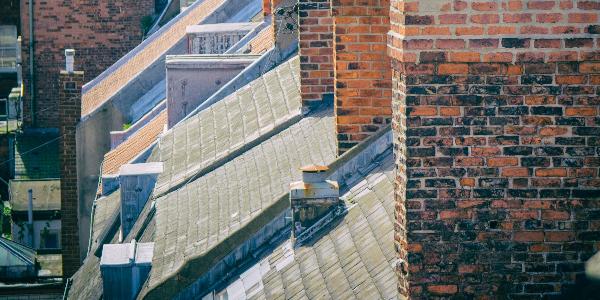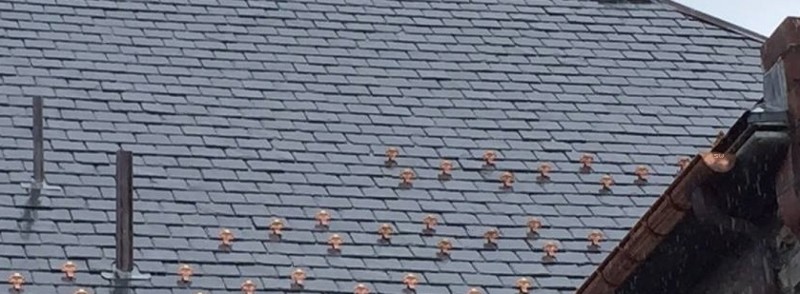A Building Material That Outlasts the Construction

By Dani Sheehan.
Learn about the extensive history of slate as a building material and how it stands the test of time.
Do you ever wonder who sat down and decided that certain substances would make for good building materials and then how they gained popularity? Julie Butler, the preservation director for The Durable Restoration Company, is fascinated by this question and has been studying material relationships and materials since earning her graduate degree in historic preservation. An architectural historian whose passion really lies with Virginia colonial history, Julie has been awestruck by slate over roughly the last eight years. She sat down to talk to us about this incredible building material and its significance in historical buildings.
Slate is an extremely versatile material because it doesn’t soak up water like most other rocks do, and it is fire resistant, which meant more before electricity was invented but also speaks to why it’s found on so many historic buildings. It’s also incredibly durable, lasting hundreds of years and withstanding various climates.
The Romans were the first people documented to use slate, not in Rome, but in England around the 5th century. As Julie explains, Rome invaded Britain in 43 A.D., moving their way from Wales north, and eventually built a fort called Segontium in northern England. Like their roofs in Rome, the fort’s roof originally has terracotta tile, “but the problem with terracotta tile that we see in England is that it does soak up water, which means that if it soaks up water and then freezes, it expands and it cracks.” This is a problem in the colder environment of England, where roofs are more likely to freeze than in Rome. When terracotta didn’t work for this roof, they used slate instead, and “the slate that’s put on this fort is found about five miles away, eight kilometers,” so it’s very likely that this was the material builders in the area were already using.
Slate continued to be used for a while, but the tradition seemed to have fallen away at the same time as the fall of the Roman empire and didn’t resurface until around the 1100s when it was used on churches and castles in the medieval ages. It was not until about the 1700s that the Spanish discovered slate and found ways to improve “quarrying technology and they started using gunpowder to blast the slate into manageable chunks, pretty similar to what we do today,” Julie explained. It was still mostly used by privileged populations, but it was more accessible and began to appear across European homes.
In the United States, slate was being used in areas like Vermont or New York where slate was first discovered, and immigrants were settling who already had knowledge of slate quarries. The industry collapsed during World War II when it was not considered an essential industry, and once the GI Bill was passed to make it easier for families to buy houses, modern construction was focused on the speed of construction to accommodate the influx of people buying homes. The resurgence of slate in the market has only been seen in the last two or three decades, which likely “has to do with the fact that it is far more environmentally friendly and truly the cost over the life of slate is actually the most cost-effective roofing material because it lasts so long.” Despite being a material that has been around for centuries, it is now being used in modern construction to give homes that unique aesthetic to set them above the rest.
Have a question? AskARoofer.
Find your local roofing contractor in the RoofersCoffeeShop® Contractor Directory.
About Dani
Dani is a writer for The Coffee Shops and AskARoofer™. When she's not writing or researching, she's teaching yoga classes or exploring new hiking trails.










Comments
Leave a Reply
Have an account? Login to leave a comment!
Sign In